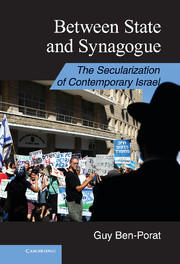3 - The State of Marriage
Regulating and De-Regulating Love
Published online by Cambridge University Press: 05 January 2013
Summary
Marriage can be secular Israelis’ most significant encounter with religious authority. Rabbinical courts hold jurisdiction over matters of marriage and divorce for all Jews in Israel, regardless of their beliefs and preferences, and the rituals are conducted in accordance with Orthodox laws. Demands for reform made by secular Israelis who object to the Orthodox monopoly, and by those prevented from marrying in Israel by that monopoly, have gained in momentum and intensity in the past two decades. Until now, these demands have failed to change the formal rules, but the new needs and desires have been channeled into secular initiatives that have aimed at bypassing the political impasse. In fact, as this chapter shows, by adopting and applying relevant strategies, the various secular entrepreneurs succeeded in creating a range of different alternatives that, to all intents and purposes, ignore the rules of the game dictated by the status quo.
Marriage is not only a private choice of two individuals. Defined and regulated by religious and political authorities, marriage is an institution that guarantees the right to a domain of privacy, but this right is itself defined by public policy (Josephson, 2005). In fact, as the anthropologist Claude Levi-Strauss (1956: 147) stated, “marriage is not, is never, and cannot be a private business.” Marriage is a social institution that “relies [on] and reproduces complex accounts of the connections between individual and community; public and private; belief and behavior; and sexuate, social, and political self understanding” and relies on formal public recognition and regulation (Metz, 2010: 86). Thus, the distinction between, on the one hand, the proper or the desired marriage and, on the other hand, the improper or banned marriage has been institutionalized and regulated by various social mechanisms. Regulation of marriage involves questions of religious and political authority and includes limitations of age and gender and boundaries between classes, ethnic, and religious groups. Consequently, the roles played by religious institutions and by the modern state in regulating marriage not only are prime movers for control and legitimization but also, on occasion, become an incentive for political debates and struggles within society and between the state and its citizens (Witte, 1997: 11). Religious authorities held control over marriage in many European and North American jurisdictions until the eighteenth and even the nineteenth centuries when the state took control over marriage (Metz, 2010: 4).
- Type
- Chapter
- Information
- Between State and SynagogueThe Secularization of Contemporary Israel, pp. 60 - 101Publisher: Cambridge University PressPrint publication year: 2013



